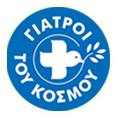Doctors of the World has been training its field staff in Greece in how to react and respond to episodes of Sexual and Gender-Based Violence in the refugee camps at which they work.
The training, which is provided as standard for all Doctors of the World staff, has particular relevance in the light of recent reports of sex-trafficking from refugee camps in the state, and in the context of what aid workers all over the state refer to as ‘worryingly high’ rates of violence motivated by sex and/or gender.
Doctors of the World protection officer in ECHO project, Alekos Anastasiou, said: «In communities across the world, in times of high stress and pressure, we see increased rates and incidences of violence, including that based on gender or sex. This is by no means a problem exclusive to the refugee population here in Greece, or indeed anywhere, but it is one unacceptable outcome of the intense and awful experiences these men, women and children have been through, in some cases for several years, and the anger loss of hope they are feeling after spending so long in sub-standard living conditions, with no sufficient information about whether or when things will change. As an organisation, we provide physical, mental and sexual health services to the refugees here, and in common with all organisations working here, we are aware of the alarmingly high rate of incidences of sexually-motivated violence. Whatever the reasons for it, it is unacceptable, and it is our responsibility to help to prevent incidences from occurring, to ensure we can recognize incidents which do happen, and to provide care and protection to those at risk, as well as to those who have experienced such violence within our mandate».
The training, given in this instance to Doctors of the World’s teams working at Kavala and Drama camps in North-Eastern Greece, began by exploring the concepts of sex (a biological matter), sexuality (with reference to people’s choice of sexual partner), and gender (with its associated societal expectations and connotations) before moving onto practical matters including spotting potential signals that violence or abuse might have taken place, how to talk to those who have suffered it, and what to do if there are indications of incidents, or if people ask for help.
The training also raised interesting questions about societal and cultural differences, including for example what constitutes and is perceived as abuse, and whether cultural relativity is appropriate or acceptable in matters of sexual relations, particularly where that relativity could potentially impact on individuals’ human rights.
Women and girls suffer by far the largest proportion of sexual and gender-based violence, but the teams were reminded that incidents can and have happened to men and boys also.
In Greek refugee camps, in the second half of 2016, UNHCR reports that of the total number of reported incidents of sexual and gender-based violence, 57% happened in Greece itself, 43% in transit or in people’s country of origin, and 84% of incidents affected women and girls.
Among these numbers, 3% per cent of incidents affected children aged 0-11, 13% affected children aged 12-17, and the remaining 84% affected adults.
Along with medical and mental health care and support given to those attacked, Doctors of the World also engage in activities which work preventatively, such as discussion groups, sessions designed to reduce stress and activities for men, women and children to take part in which help to give people a sense of purpose and an alternative to being forced to focus solely on their recent past, and the powerlessness they feel as they are forced to wait for others to make decisions which will not only affect but in many ways define, their entire futures.
